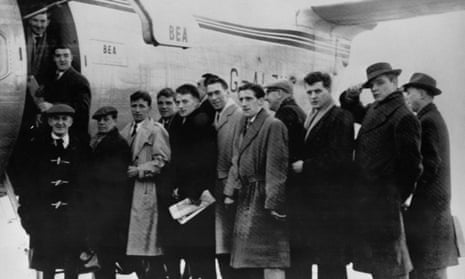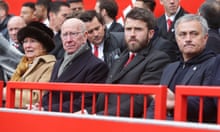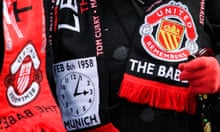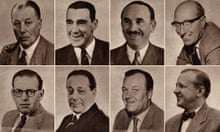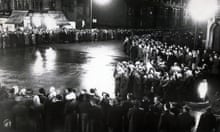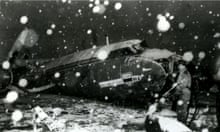The afternoon light was fading and the crowd of 52,000 were dispersing as Donny Davies completed his match report. “At Belgrade today,” it began, “in warm sunshine and on a grass pitch where the last remnants of melting snow produced the effect of an English lawn flecked with daisies, Red Star Belgrade and Manchester United began a battle of wits and courage and rugged tackling.” The concluding sentences of the piece, which recorded a 3-3 draw and United’s 5-4 win on aggregate, were the last he would ever write.
Davies was the Manchester Guardian’s chief football correspondent. A small figure in a flat cap and a muffler, he loved classical music, poetry, art, the theatre and the ballet, and read Goethe, Baudelaire and Cervantes in the original. For 25 years his job as headmaster of a school for apprentices run by Mather and Platt, a giant Manchester engineering firm, gave him time to cover league matches on Saturdays and in the holidays. His reports appeared under the byline “An Old International”, referring to his three amateur caps on the right wing for England on a tour of Austria, Hungary and Romania in 1914.
It was his habit to retreat to his study for three hours on a Sunday morning, left strictly undisturbed by his wife and two daughters, to compose his description of the previous day’s match. There was no such luxury that Wednesday afternoon in Belgrade – where, because floodlights had not yet been installed, the match kicked off at 2.45pm. Like his fellow reporters who had travelled from Manchester with United’s players and staff on a chartered BEA Elizabethan airliner, he transmitted his words in time to catch the first edition of the next morning’s paper.
Less than 24 hours later, he and seven of those newspaper colleagues would be lying dead or dying in the wreckage of G-ALZU near the slush-covered runway at Munich-Riem airport.
In those days, history had given the inhabitants of the press box a different set of life experiences. Davies had joined an infantry battalion at the outbreak of the first world war, transferring to the Royal Flying Corps for pilot training in 1917. On his second mission over the western front he was shot down near Douai and spent the rest of the war in a German POW camp, where he captained the inmates’ football team, studied languages, and read Gibbon’s Decline and Fall of the Roman Empire. He emerged in 1918 weighing six stones and given only a few months to live by a doctor evidently unaware of the strength of his character.
Another survivor of that war was Henry Rose, the flamboyant, Jaguar-driving controversialist of the Daily Express’s sports pages, who had come close to death in the trenches. A younger man, Tom Jackson of the Manchester Evening News, served through the second world war in the Army Intelligence Corps, latterly unmasking concentration camp officials.
Rose and Jackson were killed on Flight 609 along with Davies. So were Alf Clarke of the Manchester Evening Chronicle, who had been on United’s books as an amateur, and Frank Swift of the News of the World, who had made 510 appearances for Manchester City and 33 for England, including wartime caps, and whom Matt Busby had tried to lure out of retirement. George Follows of the Daily Herald, Archie Ledbrooke of the Daily Mirror and the Daily Mail’s Eric Thompson were the remaining journalists who did not survive the crash.
Two other reporters had been scheduled to make the trip but were displaced at the last minute. Davies’s decision to join the party came at the expense of a disappointed John Arlott, who had been granted a request for more ambitious assignments. Arlott would find himself writing Davies’s obituary only a matter of hours after reading his colleague’s match report in that morning’s paper. Rose had pulled rank on a younger Express man, Tony Stratton-Smith, who later founded a record label and groomed the likes of Genesis and Lindisfarne for 1970s rock stardom.
When the news of Davies’s death came through, the Guardian’s presses were stopped in salute. The son of an orphanage boy who became a mill manager, he made an early mark as a footballer with the renowned Northern Nomads and was on the brink of joining Stoke City – who had promised to cover the cost of his history degree course at Manchester University – when war broke out in 1914. After recovering his health he concentrated on cricket, playing as a batsman for Lancashire in the 1920s and serving on the committee at Old Trafford for 30 years.
In 1957, a few months before the trip to Belgrade, he retired from his post at Mather and Platt, a manufacturing colossus of the industrial revolution. The company’s Newton Heath works, painted in 1943 by LS Lowry, covered a 50-acre site incorporating not just the school but a canteen that could take 1,000 workers at a sitting.
Letters in the Guardian’s archive, written to the editor in the aftermath of the Munich disaster, attest to the admiration and affection in which Davies was held. Referring to his coverage of the United players who had perished with him, one reader wrote: “They will always be alive in our memories because he painted their movements so vividly.” His illustrious colleague Neville Cardus described him as “not only the best of the soccer writers; he was also something of a poet”. And in the words of a former Northern Nomads team-mate: “He was a grand companion and a great sportsman in the very best sense of the term. May the soil rest lightly on him …”
